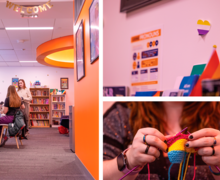SUNY-ESF artist-in-residence aims to inspire others through papermaking art
Daily Orange File Photo
An artist-in-residence at the State University of New York College of Environmental Science and Forestry uses materials such as leaves, flowers and ferns for the papermaking process.
Any student in SUNY-ESF’s paper engineering program will tell you the process of making paper is a delicate art, but artist and papermaker Emma Percy has said paper itself can be art, also.
As the artist-in-residence at the State University of New York College of Environmental Science and Forestry’s Adirondack Interpretive Center, Percy creates art in the hopes of inspiring people to connect with the ecologies and environments that surround them.
Although Percy uses a diverse range of media, paper offers the clearest connection between artists and the environment, they said.
Incorporating natural materials such as leaves, flowers and ferns into paper allows Percy to create works of art that link viewers to the location where the materials were made.
The process Percy uses to turn wood pulp and other objects into art is similar to the techniques taught in the paper engineering program, said Gary Scott, chair of SUNY-ESF’s paper and bioprocess engineering department.
“Drain the pulp on a fine screen, press the sheet to remove more water and dry the sheet to its final moisture content,” Scott said.
Scott said papermaking is something anyone could pick up. The basic materials needed for the process can all be found in a local hardware store, though Percy gathers materials from natural environments.
Percy’s other work centers on bringing people into closer contact with their environments. Percy has written a book about creating “seed bombs” to spread native plants and a book to help people explore their own local ecologies.
Seed bombing is “guerilla gardening,” a creative way “to cultivate life and be a steward of the land without boundaries,” Percy said. For Percy, art and activism are never separated: Both are ways to “introduce new ideas to society and to conceptualize alternative ways of being in the world.”
Percy aims to use art as a tool to change the world and encourages students to pursue their own interests in a connection between art and activism. It takes courage to forge your own path, Percy said, and many other people are trying to make this same connection.
In addition to the landscapes of their southern New York home, the artist’s recent work is inspired by concepts like species distribution and seasonal shifts.
One of their favorite materials to incorporate is the native milkweed plant, which produces a shimmering paper.
Sustainability and stewardship of the planet are not just a focus in Percy’s creative brand of papermaking.
Scott pointed out that the industrial papermaking process has also become more and more sustainable in the past few decades. He said the industry strives to promote efficiency, using every last bit of the raw materials it takes in, reducing pollution and obtaining nearly 70 percent of its energy from renewable sources.
Percy said everyone uses “different tactics” to explore the world around them and that means everyone approaches activism differently. Percy said making paper “is just one way art and activism come together.”
Published on October 29, 2017 at 11:28 pm
Contact Maizy: mtludden@syr.edu





